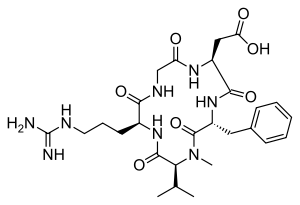Cilengitide
 | ||
| Names | ||
|---|---|---|
| IUPAC name
2-[(2S,5R,8S,11S)-5-benzyl-11-{3-[(diaminomethylidene)amino]propyl}-7-methyl-3,6,9,12,15-pentaoxo-8-(propan-2-yl)-1,4,7,10,13-pentaazacyclopentadecan-2-yl]acetic acid | ||
| Identifiers | ||
| 188968-51-6 | ||
| ChEMBL | ChEMBL429876 | |
| ChemSpider | 154046 | |
| ||
| Jmol-3D images | Image | |
| KEGG | D03497 | |
| MeSH | Cilengitide | |
| PubChem | 176873 | |
| ||
| Properties | ||
| Molecular formula |
C27H40N8O7 | |
| Molar mass | 588.66 g·mol−1 | |
| Density | 1.417 g/mL | |
| Except where noted otherwise, data is given for materials in their standard state (at 25 °C (77 °F), 100 kPa) | ||
| | ||
| Infobox references | ||
Cilengitide is a molecule designed and synthesized at the Technical University Munich in collaboration with Merck KGaA in Darmstadt. It is based on the cyclic peptide cyclo(-RGDfV-), which is selective for αv integrins, which are important in angiogenesis (forming new blood vessels), and other aspects of tumor biology. Hence, it is under investigation for the treatment of glioblastoma, where it may act by inhibiting angiogenesis, and influencing tumor invasion and proliferation.[1][2]
The European Medicines Agency has granted cilengitide orphan drug status.[3]
Cilengitide seems to function by inhibiting the FAK/src/AKT pathway and inducing apoptosis in endothelial cells [4]. Preclinical studies in mice of cilengitide were able to demonstrate efficacious tumor regression.[4]
Phase II studies were able to demonstrate that cilengitide as a potential monotherapy in patients with recurrent glioblastoma [5] with high intratumor drug levels when 2000 mg of cilengitide is given twice weekly.[6] In a rat xenograft model, cilengitide was able to potentiate the cytotoxic effects of radiation when cilengitide was administered prior to radiation therapy.[7] When combined with radiation, inhibition of integrin expression by cilengitide synergistically improves the cytotoxic effects of ionizing radiation for glioblastoma.[8] Cilengitide is well tolerated, in combination with radiation and temozolomide, at a dose of 2000 mg in patients with newly diagnosed glioblastoma, regardless of MGMT promoter status.[9] In a phase I/IIa study, the addition of cilengitide to the standard of care for newly diagnosed glioblastoma (surgical resection followed by temozolomide and radiation therapy) improves progression-free survival and overall survival in patients with MGMT promoter methylation.[10]
However, in a subsequent study, cilengitide does not seem to alter the pattern of glioblastoma progression,[11] and in an EORTC phase III randomized, controlled, multicenter clinical trial, consisting of over 500 patients in 23 countries, the addition of cilengitide to the standard of care did not improve overall survival in patients with newly diagnosed glioblastoma and methylated MGMT promoter status [12] A phase II study, the CORE trial, is currently being conducted in patients with newly diagnosed glioblastoma and unmethylated MGMT promoter status.[13]
References
- ↑ Burke P, DeNardo S, Miers L, Lamborn K, Matzku S, DeNardo G (2002). "Cilengitide targeting of αvβ3 integrin receptor synergizes with radioimmunotherapy to increase efficacy and apoptosis in breast cancer xenografts". Cancer Res 62 (15): 4263–72. PMID 12154028.
- ↑ Goodman Simon L., Hoelzemann Guenter, Sulyok Gabor A. G., Kessler Horst (2002). "Nanomolar Small Molecule Inhibitors for αvβ6, αvβ5, and αvβ3 Integrins". Journal of Medicinal Chemistry 45 (5): 1045–51. doi:10.1021/jm0102598. PMID 11855984.
- ↑ H. Spreitzer (October 27, 2008). "Neue Wirkstoffe - Cilengitide". Österreichische Apothekerzeitung (in German) (22/2008): 1136–7.
- ↑ Yamada S, Bu XY, Khankaldyyan V, Gonzales-Gomez I, McComb JG, Laug WE: Effect of the angiogenesis inhibitor Cilengitide (EMD 121974) on glioblastoma growth in nude mice. Neurosurgery 2006, 59(6):1304-1312; discussion 1312. PMID 19114005
- ↑ Reardon DA, Fink KL, Mikkelsen T, Cloughesy TF, O'Neill A, Plotkin S, Glantz M, Ravin P, Raizer JJ, Rich KM et al: Randomized phase II study of cilengitide, an integrin-targeting arginine-glycine-aspartic acid peptide, in recurrent glioblastoma multiforme. J Clin Oncol 2008, 26(34):5610-5617.PMID 18981465
- ↑ Gilbert MR, Kuhn J, Lamborn KR, Lieberman F, Wen PY, Mehta M, Cloughesy T, Lassman AB, Deangelis LM, Chang S et al: Cilengitide in patients with recurrent glioblastoma: the results of NABTC 03-02, a phase II trial with measures of treatment delivery. J Neurooncol 2012, 106(1):147-153. PMID 21739168
- ↑ Mikkelsen T, Brodie C, Finniss S, Berens ME, Rennert JL, Nelson K, Lemke N, Brown SL, Hahn D, Neuteboom B et al: Radiation sensitization of glioblastoma by cilengitide has unanticipated schedule-dependency. Int J Cancer 2009, 124(11):2719-2727. PMID 19199360
- ↑ Mikkelsen T, Brodie C, Finniss S, Berens ME, Rennert JL, Nelson K, Lemke N, Brown SL, Hahn D, Neuteboom B et al: Radiation sensitization of glioblastoma by cilengitide has unanticipated schedule-dependency. Int J Cancer 2009, 124(11):2719-2727. PMID 19199360
- ↑ Nabors LB, Mikkelsen T, Hegi ME, Ye X, Batchelor T, Lesser G, Peereboom D, Rosenfeld MR, Olsen J, Brem S et al: A safety run-in and randomized phase 2 study of cilengitide combined with chemoradiation for newly diagnosed glioblastoma (NABTT 0306). Cancer 2012, 118(22):5601-5607. PMID 22517399
- ↑ Stupp R, Hegi ME, Neyns B, Goldbrunner R, Schlegel U, Clement PM, Grabenbauer GG, Ochsenbein AF, Simon M, Dietrich PY et al: Phase I/IIa study of cilengitide and temozolomide with concomitant radiotherapy followed by cilengitide and temozolomide maintenance therapy in patients with newly diagnosed glioblastoma. J Clin Oncol 2010, 28(16):2712-2718. PMID 20439646
- ↑ Eisele G, Wick A, Eisele AC, Clement PM, Tonn J, Tabatabai G, Ochsenbein A, Schlegel U, Neyns B, Krex D et al: Cilengitide treatment of newly diagnosed glioblastoma patients does not alter patterns of progression. J Neurooncol 2014, 117(1):141-145. PMID 24442484
- ↑ Merck Group. "Phase III Trial of Cilengitide Did Not Meet Primary Endpoint in Patients With Newly Diagnosed Glioblastoma, Date accessed: 3/24/2014."
- ↑ ASCO Meeting Library. "Cilengitide combined with standard treatment for patients with newly diagnosed glioblastoma and methylated O6-methylguanine-DNA methyltransferase (MGMT) gene promoter: Key results of the multicenter, randomized, open-label, controlled, phase III CENTRIC study, Date accessed: 3/24/2014."